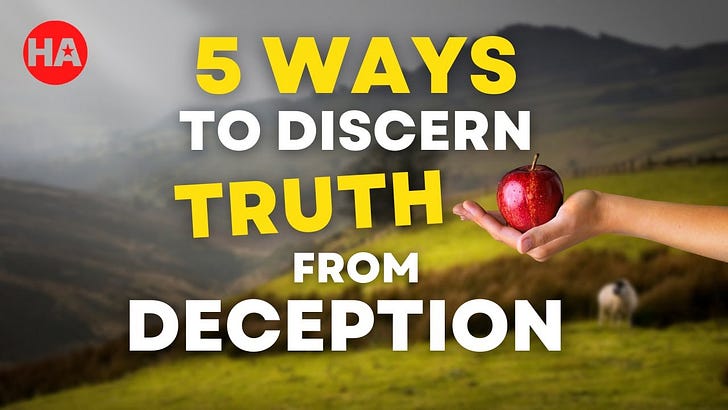Why GULLIBILITY Promotes DECEPTION
Dr. Will Tuttle, author of FOOD for FREEDOM, explains why gullibility harms society and how people are so entranced by the narratives pushed by government, the media and "authorities."
“Unquestioning compliant behavior leads to ever-increasing despotism.” —Dr. Will Tuttle
Friends, I want to address a topic that I believe is one of the most harmful issues facing our society: gullibility and its role in promoting deception.
A gullible person is one who is easily bamboozled, duped and hoodwinked.
Gullibility is not to be confused with naivete or innocence; gullibility is a willing ignorance that is destructive to society and harms us all.
Many people are unwilling to question the sources of their beliefs and the information they consume, and this reluctance to engage in critical thinking can lead to widespread deception, impacting us all.
In my video above, I share one book that profoundly addresses this issue: "Food for Freedom" by Dr. Will Tuttle.
This book, sent to me by my friend and fellow truther (and animal advocate) Andy, is an eye-opener on how gullibility fosters deception.
Dr. Will Tuttle, the author of "The World Peace Diet," has written "Food for Freedom" to help readers understand the profound impact of gullibility on society because so many people are gripped by fear and other emotions that cloud their judgment. This book challenges readers to “liberate their consciousness from habitual thinking,” which is a significant barrier to clear, rational, and sober-minded thinking.
Profound insights from "Food for Freedom"
Dr. Tuttle's book is rich with concepts that resonate with current events and societal issues. In discussing how people are victimized by deception, Dr. Will shares these insights in the book’s introduction:
“As we awaken, we feel increasingly compelled to question what we believe to be true. We also are compelled to question our trusted sources of truth because most of us have been raised to trust authorities, experts, government spokespeople, media outlets, doctors, journalists, and educators, and it's distressing in the extreme to face the fact that often these people are completely wrong in what they are telling us and it's more difficult still that they and their superiors are lying to us."
This whole mess leads to cognitive dissonance, where our old beliefs clash with new, uncomfortable truths. Tuttle notes that a typical response to this cognitive meltdown is the Semmelweis reflex, which makes us "simply and immediately reject anything that threatens our trust in official narratives." (Oh, boy do I get a ton of hate mail whenever I dare to question the logic of the information and images shoved in our faces that just don't add up!)
So this experience nudges us to actually use our brains, developing critical thinking skills to sift through evidence, spot biases, and analyze reality. It’s not a fun ride—it’s psychologically taxing and can make us doubt everything. But it’s crucial for cutting through the nonsense and figuring out what's actually true; otherwise, this rejection fosters toxic gullibility, which, as Dr. Tuttle points out, shuts down inherent wisdom and critical thinking.
Once we start to question the source/power of authority as presented to us by the media, teachers, government, doctors, “experts” and others, we may experience a teleological crisis, which involves questioning the fundamental purposes and goals of one's life, society, or humanity as a whole.
As Dr. Will Tuttle describes, "we find ourselves stepping out of the mainstream consensus trance that gives meaning to the general population and we are compelled to grapple with the teleology of our society and of our life itself." This means reflecting on essential questions such as "what is the purpose of our human species and of our culture and civilization? What is our individual purpose for this lifetime if we are no longer in alignment with the official narratives and we no longer believe the so-called official truths?"
People may feel disconnected from mainstream narratives and seek deeper, more authentic purposes. With effort, Tuttle notes, "we can deepen our connection with our purpose and develop our capacity to shine the light and example of our unique life into our culture, although it may not always be recognized as such."
This type of crisis can be unsettling and challenging, but it also has the potential to lead to significant personal growth and societal change as people search for more meaning and purpose in life.
Dr. Will Tuttle makes some compelling critical points about gullibility, emphasizing how harmful it truly is.
Gullibility means believing everything without questioning it, and he argues that this trait is dangerous because it increases violence in the world. It enables and promotes deception, which he describes as a treacherous form of violence. In stressful situations, gullibility can become toxic, leading to aggressive behavior against those who refuse to comply with internalized narratives and mandates.
Tuttle underscores that while deliberate deception is widely recognized as unethical and harmful, it's crucial to understand that gullibility is equally unethical and harmful. He powerfully states, "There is significant truth in the old saying, 'You cannot fool an honest person.'" Gullibility doesn’t just allow deception; it actively spurs it on.
Many view the easily deceived as innocent victims, but Tuttle points out that there's something nefarious and irresponsible in allowing ourselves to be victimized by deception. When we are honest and aware, we are not easily fooled.
"Food for Freedom" is a compelling read that challenges us to think critically and question the sources of our beliefs. By doing so, we can protect ourselves and society from the harmful effects of deception. I highly recommend this book to anyone interested in freeing themselves from the chains of gullibility.
Thank you, Andy, for sending me this book, and thank you, Dr. Tuttle, for writing it. To all my savvy, sophisticated, and supportive followers, let's continue to cultivate discernment and read between the lies. You can find more information about the book at foodforfreedom.net.
Speaking of deceit and discernment, read this next for 5 ways to discern truth from deception:









Peggy! This article was perfect timing! In the very first insight, Dr. Tuttle discusses "cognitive dissonance!" I literally just released a podcast on the topic of cognitive dissonance and introduce what I call "cognitive RESONANCE." https://unorthodoxy.substack.com/p/how-voting-creates-cognitive-dissonance
I love the quote: "Gullibility doesn’t just allow deception; it actively spurs it on." This is exactly what I talk about in my article on false flags and fake events like the Trump situation (https://unorthodoxy.substack.com/p/false-flags-and-fake-false-flags). "gullibility is a willing ignorance that is destructive to society and harms us all." -- if we sit here and accept the lie that they are telling us, staying gullible, we spread the destruction along.
Thanks for this and I'm going to look to check this out! If you're interested in another book to read, here's my book! My thoughts on what has happened in the last two hundred years and the impact Industrialization has had on us: https://unorthodoxy.substack.com/p/the-history-of-you-a-book-that-connects
Thanks again for this article! Chat later :)
Many thanks, Peggy, for all your efforts over the past several years and especially for helping people reclaim their wisdom and discernment, and find the courage and the means to refuse to comply with tyranny. Love supporting your work, and looking forward to more!